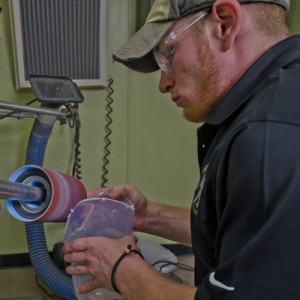MCOP Blog
Insights from our prosthetists about new technology, advances in prosthetics, & more
The Benefits of Rolled Silicone Sockets
June 24, 2019Rolled Silicone Sockets for Prosthetic Devices
At MCOP, we’re always staying up with the latest breakthroughs related to prosthetics, sockets, and the materials used to build them. One of the biggest and most recent breakthroughs in the field of prosthetic silicone technology is what’s known as HTV (high-temperature vulcanisation) silicone, otherwise known as “rolled silicone”.
This type of material is developed through a specialized vulcanization process that involves curing the silicone in a high-pressure autoclave oven container to vastly increase its strength.
While rolled silicone has been used to build prosthetics since the 90s, that usage has been somewhat limited because it often requires specialized equipment and highly-skilled professionals to prepare it for prosthetic usage. Because of the complexity associated with making silicone sockets, the team at MCOP has spent years investing in the proper equipment, staff, and training to produce these materials in-house.
Here, you’ll find an insightful overview of rolled silicone’s benefits for different types of amputees, as well as the exciting future possibilities it brings to the world of prosthetic silicone sockets.
The Unique Benefits of Rolled Silicone Sockets
Rolled silicone is becoming an increasingly popular material for the many different types of amputees we see here at MCOP, and that’s in large part due to the many unique benefits it provides over other materials.
Some of the unique benefits of rolled silicone sockets include:
- Increased comfort for the wearer thanks to the material’s incredibly soft and supple feel.
- A natural accommodation to more complex limb shapes, which is especially beneficial for upper-extremity amputees who usually have to rely on the less flexible thermoplastics typically used in prosthetics.
- Exceptional relief for recurring pains associated with lower-extremity amputations, particularly ones related to the residual limb (such as sensitive bones or heterotopic ossification). This is thanks to the reduced pressure and friction around the socket brim that rolled silicone provides.
- Enhanced wearability thanks to rolled silicone’s slimline design, which gives the material an incredibly natural and “wearable” feel that’s ideal for everyday activities, particularly for individuals recovering from lower-limb procedures such as hip disarticulations.
- Less heat buildup thanks to the material’s natural ability to remain much cooler than other types of sockets, resulting in less sweat, discomfort, and subsequent need to remove the socket off throughout the day – a great perk for on-the-go amputees with busy schedules and things to do!
- Surprisingly simple customization potential that allows the wearer to modify the socket with minimal difficulty, especially when aided by a trained professional. This allows for a number of convenient customizable features, such as the ability to add softer silicone components in more sensitive areas, all without affecting the integrity, light weight, and maneuverability of the device as a whole.
In addition to these features, rolled silicone is also hypoallergenic, easy to clean, and doesn’t deteriorate over time like flexible plastic alternatives do. No wonder it’s such a hit with our clients!
A Promising Future for Prosthetic Socket Technology
At the end of the day, we know that prosthetic socket design all comes down to ensuring optimal comfort and safety. Even though rolled silicone sockets for prosthetic devices is an underutilized technology when compared to other types of sockets, there are still many levels of amputees who could benefit from the improvements associated with rolled silicone sockets.
That’s why the team at MCOP is currently developing a standardized process to introduce this exciting new technology to our growing number of above-knee and below-knee clients, in addition to our hip disarticulation, upper-extremity, and numerous other types of amputees. There are a lot of promising things currently available, and even more exciting advancements coming in the future!
If you’re curious what services and insights we can provide in relation to rolled silicone sockets (or any other types of sockets!), feel free to contact us today, or stop in and see us at any of our locations around the country!

